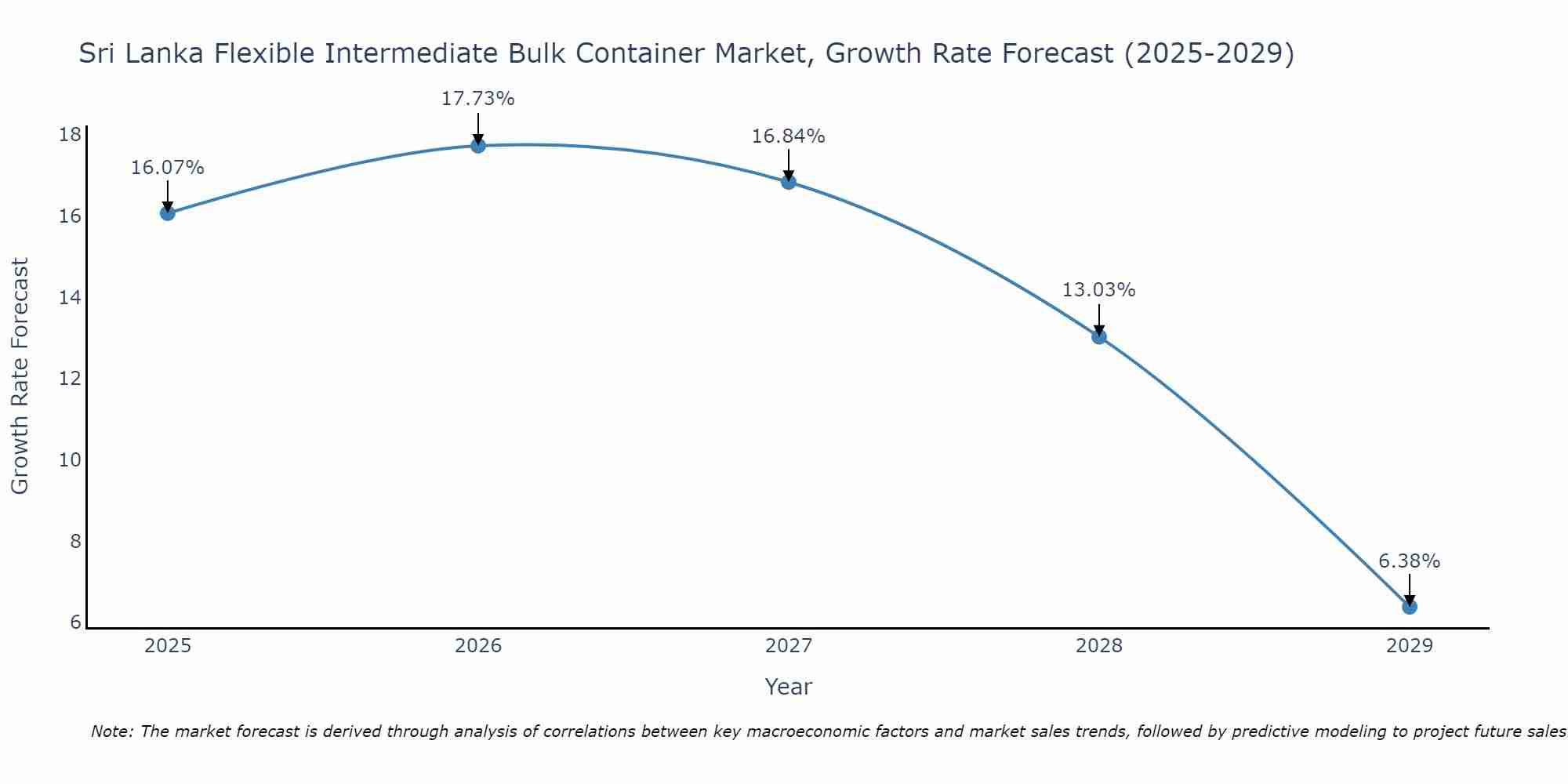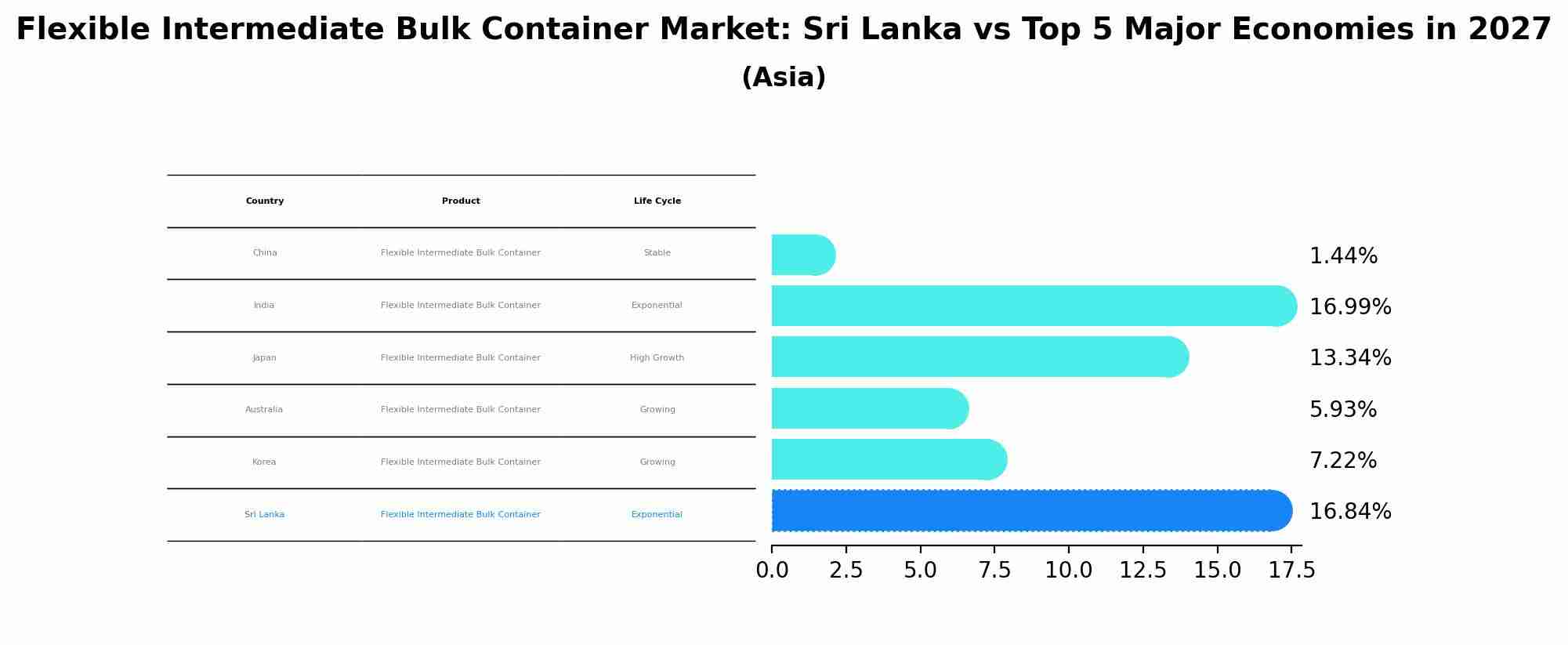Sri Lanka Flexible Intermediate Bulk Container Market Outlook | Industry, Forecast, COVID-19 IMPACT, Analysis, Size, Value, Companies, Growth, Share, Trends & Revenue
| Product Code: ETC373891 | Publication Date: Aug 2022 | Updated Date: Jul 2025 | Product Type: Market Research Report | |
| Publisher: 6Wresearch | Author: Sachin Kumar Rai | No. of Pages: 75 | No. of Figures: 35 | No. of Tables: 20 |
Sri Lanka Flexible Intermediate Bulk Container Market Size Growth Rate
The Sri Lanka Flexible Intermediate Bulk Container Market is projected to witness mixed growth rate patterns during 2025 to 2029. The growth rate begins at 16.07% in 2025, climbs to a high of 17.73% in 2026, and moderates to 6.38% by 2029.

Flexible Intermediate Bulk Container Market: Sri Lanka vs Top 5 Major Economies in 2027 (Asia)
The Flexible Intermediate Bulk Container market in Sri Lanka is projected to grow at a exponential growth rate of 16.84% by 2027, within the Asia region led by China, along with other countries like India, Japan, Australia and South Korea, collectively shaping a dynamic and evolving market environment driven by innovation and increasing adoption of emerging technologies.

Sri Lanka Flexible Intermediate Bulk Container Market Synopsis
The Sri Lanka Flexible Intermediate Bulk Container (FIBC) market is experiencing steady growth driven by the country`s expanding agricultural and industrial sectors. FIBCs, also known as bulk bags or super sacks, are widely utilized for the storage and transportation of bulk goods such as grains, fertilizers, and construction materials. The market is characterized by a competitive landscape with both domestic and international players offering a range of FIBC products tailored to various end-user requirements. Key factors influencing market growth include increasing demand for efficient and cost-effective packaging solutions, rising awareness of FIBCs` environmental benefits, and advancements in manufacturing technologies. The market is expected to witness further growth as industries increasingly adopt FIBCs for their superior strength, durability, and sustainability features.
Sri Lanka Flexible Intermediate Bulk Container Market Trends
The Sri Lanka Flexible Intermediate Bulk Container (FIBC) market is currently witnessing a growing demand due to the increasing focus on cost-effective and environmentally friendly packaging solutions. With industries such as agriculture, construction, and chemical sectors relying on FIBCs for bulk transportation of goods, the market is experiencing a steady growth trajectory. Additionally, the shift towards sustainable packaging options has led to the development of eco-friendly FIBCs made from recyclable materials, further driving market growth. Manufacturers are also focusing on enhancing the durability and safety features of FIBCs to meet the diverse needs of end-users. Overall, the Sri Lanka FIBC market is poised for expansion, fueled by the demand for efficient and sustainable packaging solutions across various industries.
Sri Lanka Flexible Intermediate Bulk Container Market Challenges
In the Sri Lanka Flexible Intermediate Bulk Container (FIBC) market, some challenges faced include lack of awareness about the benefits of FIBCs among potential users, competition from traditional packaging methods, such as sacks and drums, and the presence of counterfeit or low-quality FIBCs in the market. Additionally, fluctuations in raw material prices and limited availability of skilled labor for FIBC production in Sri Lanka can impact the overall market growth. Furthermore, regulatory compliance and quality standards adherence are crucial challenges that need to be addressed to ensure product safety and reliability. Overall, overcoming these challenges will require educating the market about the advantages of FIBCs, improving quality control measures, and enhancing industry collaboration to drive growth and sustainability in the Sri Lanka FIBC market.
Sri Lanka Flexible Intermediate Bulk Container Market Investment Opportunities
The Sri Lanka Flexible Intermediate Bulk Container (FIBC) market presents several investment opportunities due to the country`s growing industrial sector and increasing demand for bulk packaging solutions. Investing in the manufacturing and distribution of FIBCs in Sri Lanka can be lucrative, considering the rise in industries such as agriculture, construction, and chemicals that rely on bulk packaging for transportation and storage. Additionally, with the government promoting foreign investments and trade agreements with other countries, there is potential for exporting FIBCs to international markets. Furthermore, incorporating innovative and sustainable practices in FIBC production, such as using eco-friendly materials or offering customization options, can help attract a wider customer base and differentiate from competitors in the market.
Jordan Agar Market Government Policies
The Sri Lankan government has implemented policies to regulate the Flexible Intermediate Bulk Container (FIBC) market, focusing on quality standards and environmental sustainability. The government has set guidelines for the production and importation of FIBCs to ensure compliance with safety and quality requirements. Additionally, in line with global efforts to reduce plastic waste, Sri Lanka has introduced regulations to promote the use of eco-friendly and recyclable materials in FIBCs. The government is also working to encourage domestic production of FIBCs to boost local manufacturing capabilities and reduce dependency on imports. Overall, these policies aim to foster a competitive and sustainable FIBC market in Sri Lanka while addressing environmental concerns and promoting economic growth in the industry.
Sri Lanka Flexible Intermediate Bulk Container Market Future Outlook
The future outlook for the Sri Lanka Flexible Intermediate Bulk Container (FIBC) market appears promising with steady growth projected in the coming years. Factors such as increasing industrialization, growing demand for efficient packaging solutions in various sectors including agriculture, construction, and chemicals, as well as the emphasis on sustainability and cost-effectiveness are expected to drive the market expansion. Additionally, the rise in international trade activities and the versatility of FIBCs in transporting and storing bulk goods make them a preferred choice for many businesses. With advancements in technology leading to the development of innovative FIBC designs and materials, the market is likely to witness further growth and opportunities for manufacturers and suppliers in Sri Lanka.
Key Highlights of the Report:
- Sri Lanka Flexible Intermediate Bulk Container Market Outlook
- Market Size of Sri Lanka Flexible Intermediate Bulk Container Market, 2021
- Forecast of Sri Lanka Flexible Intermediate Bulk Container Market, 2031
- Historical Data and Forecast of Sri Lanka Flexible Intermediate Bulk Container Revenues & Volume for the Period 2018 - 2031
- Sri Lanka Flexible Intermediate Bulk Container Market Trend Evolution
- Sri Lanka Flexible Intermediate Bulk Container Market Drivers and Challenges
- Sri Lanka Flexible Intermediate Bulk Container Price Trends
- Sri Lanka Flexible Intermediate Bulk Container Porter's Five Forces
- Sri Lanka Flexible Intermediate Bulk Container Industry Life Cycle
- Historical Data and Forecast of Sri Lanka Flexible Intermediate Bulk Container Market Revenues & Volume By Product for the Period 2018 - 2031
- Historical Data and Forecast of Sri Lanka Flexible Intermediate Bulk Container Market Revenues & Volume By Type A for the Period 2018 - 2031
- Historical Data and Forecast of Sri Lanka Flexible Intermediate Bulk Container Market Revenues & Volume By Type B for the Period 2018 - 2031
- Historical Data and Forecast of Sri Lanka Flexible Intermediate Bulk Container Market Revenues & Volume By Type C for the Period 2018 - 2031
- Historical Data and Forecast of Sri Lanka Flexible Intermediate Bulk Container Market Revenues & Volume By Type D for the Period 2018 - 2031
- Historical Data and Forecast of Sri Lanka Flexible Intermediate Bulk Container Market Revenues & Volume By End-Use for the Period 2018 - 2031
- Historical Data and Forecast of Sri Lanka Flexible Intermediate Bulk Container Market Revenues & Volume By Food for the Period 2018 - 2031
- Historical Data and Forecast of Sri Lanka Flexible Intermediate Bulk Container Market Revenues & Volume By Chemical for the Period 2018 - 2031
- Historical Data and Forecast of Sri Lanka Flexible Intermediate Bulk Container Market Revenues & Volume By Pharmaceuticals for the Period 2018 - 2031
- Historical Data and Forecast of Sri Lanka Flexible Intermediate Bulk Container Market Revenues & Volume By Others for the Period 2018 - 2031
- Sri Lanka Flexible Intermediate Bulk Container Import Export Trade Statistics
- Market Opportunity Assessment By Product
- Market Opportunity Assessment By End-Use
- Sri Lanka Flexible Intermediate Bulk Container Top Companies Market Share
- Sri Lanka Flexible Intermediate Bulk Container Competitive Benchmarking By Technical and Operational Parameters
- Sri Lanka Flexible Intermediate Bulk Container Company Profiles
- Sri Lanka Flexible Intermediate Bulk Container Key Strategic Recommendations
Frequently Asked Questions About the Market Study (FAQs):
- Single User License$ 1,995
- Department License$ 2,400
- Site License$ 3,120
- Global License$ 3,795
Search
Thought Leadership and Analyst Meet
Our Clients
Related Reports
- Canada Oil and Gas Market (2026-2032) | Share, Segmentation, Value, Industry, Trends, Forecast, Analysis, Size & Revenue, Growth, Competitive Landscape, Outlook, Companies
- Germany Breakfast Food Market (2026-2032) | Industry, Share, Growth, Size, Companies, Value, Analysis, Revenue, Trends, Forecast & Outlook
- Australia Briquette Market (2025-2031) | Growth, Size, Revenue, Forecast, Analysis, Trends, Value, Share, Industry & Companies
- Vietnam System Integrator Market (2025-2031) | Size, Companies, Analysis, Industry, Value, Forecast, Growth, Trends, Revenue & Share
- ASEAN and Thailand Brain Health Supplements Market (2025-2031) | Strategy, Consumer Insights, Analysis, Investment Trends, Opportunities, Growth, Size, Share, Industry, Revenue, Segments, Value, Segmentation, Supply, Forecast, Restraints, Outlook, Competition, Drivers, Trends, Demand, Pricing Analysis, Competitive, Strategic Insights, Companies, Challenges
- ASEAN Bearings Market (2025-2031) | Strategy, Consumer Insights, Analysis, Investment Trends, Opportunities, Growth, Size, Share, Industry, Revenue, Segments, Value, Segmentation, Supply, Forecast, Restraints, Outlook, Competition, Drivers, Trends, Demand, Pricing Analysis, Competitive, Strategic Insights, Companies, Challenges
- Europe Flooring Market (2025-2031) | Outlook, Share, Industry, Trends, Forecast, Companies, Revenue, Size, Analysis, Growth & Value
- Saudi Arabia Manlift Market (2025-2031) | Outlook, Size, Growth, Trends, Companies, Industry, Revenue, Value, Share, Forecast & Analysis
- Uganda Excavator, Crane, and Wheel Loaders Market (2025-2031) | Strategy, Consumer Insights, Analysis, Investment Trends, Opportunities, Growth, Size, Share, Industry, Revenue, Segments, Value, Segmentation, Supply, Forecast, Restraints, Outlook, Competition, Drivers, Trends, Demand, Pricing Analysis, Competitive, Strategic Insights, Companies, Challenges
- Rwanda Excavator, Crane, and Wheel Loaders Market (2025-2031) | Strategy, Consumer Insights, Analysis, Investment Trends, Opportunities, Growth, Size, Share, Industry, Revenue, Segments, Value, Segmentation, Supply, Forecast, Restraints, Outlook, Competition, Drivers, Trends, Demand, Pricing Analysis, Competitive, Strategic Insights, Companies, Challenges
Industry Events and Analyst Meet
Whitepaper
- Middle East & Africa Commercial Security Market Click here to view more.
- Middle East & Africa Fire Safety Systems & Equipment Market Click here to view more.
- GCC Drone Market Click here to view more.
- Middle East Lighting Fixture Market Click here to view more.
- GCC Physical & Perimeter Security Market Click here to view more.
6WResearch In News
- Doha a strategic location for EV manufacturing hub: IPA Qatar
- Demand for luxury TVs surging in the GCC, says Samsung
- Empowering Growth: The Thriving Journey of Bangladesh’s Cable Industry
- Demand for luxury TVs surging in the GCC, says Samsung
- Video call with a traditional healer? Once unthinkable, it’s now common in South Africa
- Intelligent Buildings To Smooth GCC’s Path To Net Zero


















